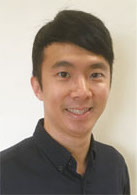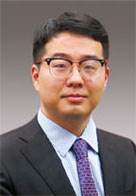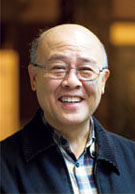通識教育模範教學獎2018
時間: 3:45-5:30pm
地點: 香港中文大學邵逸夫堂留足展覽廳
本年度榮獲提名的老師有十三位。教務會通識教育委員會議決頒發「通識教育模範教學獎」予大學通識教育部的張恆鏘博士,機械與自動化工程學系的韓東昆博士,以及地理與資源管理學系的王福義教授。
張恆鏘博士

Dr. Cheung Hang Cheong Derek obtained B.Sc. and Ph.D. degrees in Biochemistry from The Chinese University of Hong Kong. His research mainly focused on studying the regulatory pathway of a telomerase protein and its implication on cancer cell growth. He has been working as a lecturer in the Office of University General Education since 2012 and is responsible for teaching one of the compulsory General Education Foundation (GEF) courses UGFN1000 In Dialogue with Nature. Dr. Cheung is active in developing online micro-modules and educational mobile applications to meet the diverse needs of students. He is also interested in pedagogical research on evaluating the effectiveness of various learning activities and innovations in facilitating students’ attainment of learning outcomes.
In a world rapidly shaped by technological advancement, students are exposed to overwhelming information from social media all the time and may have their beliefs and values molded unconsciously. As a teacher, I always strive for cultivating my students to become a reflective person who can consider carefully when making judgment, and can scrutinize his/her underlying values, beliefs, assumptions and presuppositions from multiple perspectives. I believe this process and mindset allow students to understand better the rationale that governs their actions and judgments. Moreover, they can evaluate the meaning of those judgments and develop alternative approaches. Such skill is crucial for students’ intellectual development and for helping them to make rational decisions in the face of different challenges in their daily lives.
Teaching UGFN1000 In Dialogue with Nature provides me an excellent opportunity to put my teaching philosophy into practice. The course is so designed that it is not merely conducive to widening students’ vision other than their major discipline, but also provides an excellent platform for students to reflect on different ways of thinking including their own. To achieve this, a teacher should play three essential roles: (1) facilitate students’ understanding of the course materials and their exploration of relevant knowledge so they can approach the issues from various perspectives; (2) facilitate students’ integration of the knowledge with their personal thoughts or beliefs; and (3) constantly reflect on and refine his teaching practices from students’ perspective.

Fundamentally, I believe the understanding of various thoughts is prerequisite for having a good reflection process. Besides the conventional face-to-face lecturing, I have contributed to the development of several learning support aids with a team of General Education Foundation Programme teachers to promote students’ understanding and exploration of relevant knowledge. A mobile application called “DiaNable” was developed to act as a reading companion that allows students to clarify the concepts by themselves through multiple choices questions. Moreover, a set of online micro-modules is developed to explain the basic scientific concepts that are essential to the understanding of the assigned texts as well as to help students to appreciate diverse viewpoints of each classic.
To be a reflective person, one should not rest and stop in the phase of understanding the knowledge. Students should internalize the knowledge and integrate knowledge with their thoughts. This can be facilitated by an appropriate design of discussion questions and learning activities. I have been adopting various teaching and learning (T&L) activities for promoting students’ reflection, such as utilizing interesting video clips as a prompt, role-playing debate, and mini-games to arouse students’ interest and engage them in a more interactive discussion. However, a reflective process is not always a comfortable process as it does not only involve rationality but also triggers emotional responses, especially when the person encounters ideas that contradict with his/her core values or religious belief. On those issues, I present myself as the students’ companion and share with them my own experience in the thinking process, such as how I would approach the problem logically; the struggle and emotion aroused when I encounter something contradicting, and the process of how I would gradually reshape my views. For instance, in one of my classes when we discussed the questions on “the origin of human,” I shared my struggles in dealing with the conflict between the scientific knowledge and my religious belief. This probably lets students feel that they are not alone and gives them the motivation to go on.

Not only hoping my students would be reflective, I always remind myself to be a reflective teacher. Teaching and learning are tightly connected; it is crucial for me to evaluate my teaching from the students’ perspective. I am involved in several pedagogical research projects which make use of both quantitative and qualitative methods to evaluate students’ attainment of the course intended learning outcomes (ILOs), students’ perceived effectiveness of various learning activities and supporting learning tools, students’ social presence in the tutorial discussion, and students’ learning strategies. The results have informed me of the efficacy of the current pedagogies and helped me to refine the lesson designs.
I believe the three elements above can produce a drive towards continuous improvement of the learning experience of students in the course and bring the General Education Foundation Programme forward. Through general education, I wish students can experience the joy of intellectual exploration by scrutinizing their underlying values, beliefs, and presuppositions. I believe this sense of enjoyment will become an intrinsic motivation for students to continue the reflective practice learnt in GEF throughout their life-long journey.
Finally, I would like to express my heartfelt gratitude to all my colleagues in the GEF programme. All the learning support tools mentioned above are the collaborative ideas and efforts from various teams of GEF teachers. Moreover, I have been inspired by the valuable teaching experiences and pedagogies shared by my colleagues, which significantly contributed to the development of my teaching practice and made me a better teacher.

韓東昆博士

Dr. Han Dongkun is currently a lecturer at the Department of Mechanical and Automation Engineering, The Chinese University of Hong Kong. He earned his Ph.D. degree in electrical and electronic engineering from The University of Hong Kong. From 2014 to 2016, he was a research scientist at the Department of Informatics, Technical University of Munich, Germany. From 2016 to 2017, he was a research fellow at the Department of Aerospace Engineering, the University of Michigan, Ann Arbor, United States. He now teaches three General Education courses: UGEB1307 Energy and Green Society, UGEB2303 Robots in Action, and GENA1113 Student-Oriented Teaching and Seminar. One of his recent projects is based on UGEB2303 Robots in Action and develops a mobile APP for assisting students to make their first robot. He is also focusing on implementing “flipped classroom” in General Education. He takes an active role in improving students’ presentation skills. He was the chairman of blue toastmasters at the Technical University of Munich, and has organized several workshops to better students’ communication skills at CUHK.
Why do I Choose to be a Teacher?
To answer this question, I would like to borrow the words from Wislawa Szymborska, “There is, has been, and will always be a certain group of people whom inspiration visits. It is made up of all those who have consciously chosen their calling and do their job with love and imagination. Their work becomes one continuous adventure as long as they manage to keep discovering new challenges in it.” For me, teaching is the chosen calling, providing me with endless love, imagination, passion, and satisfaction. Time and time again, this scenario comes to me that an old course instructor, after decades in classroom, still strives to ask how he could use cutting-edge technologies to inspire students. Probably, that is why teaching is amazing to me.
Conceptualization of Teaching
Knowledge can be communicated, but not wisdom; the latter is the capability to get knowledge and use it wisely. Therefore, transmitting knowledge is important, while a more significant role of teaching lies in the efforts on inspiring students to learn, facilitating students to learn, and pointing out the way through which students can learn further and faster. Based on this understanding, more efforts are devoted to providing public seminars to facilitate students to learn, e.g., seminar on introducing search engines for literature review.

Teaching Methodology
New technologies and devices are deployed to get students more engaged in the teaching materials. Some of the strategies about General Education course design are listed as follows.
- eLearning with a tablet and real robots: In the course UGEB 2303 Robots in Action, an interactive learning environment is created by using mobile applications with a robotic arm, where students can learn basic definitions and fundamental concepts of robots. By using a tablet or their mobile phones, students could also check the change of parameters from time to time by changing the position and angles of the robotic arm. In addition, to control a wheeled robot, different tasks are designed for students and enable them to face, analyze, and solve these practical problems as mechanical engineers, e.g., in order to allow the robot to track a dashed line, students are asked to propose a control strategy for the robot, write corresponding programming codes to valid their strategy, and adjust the control parameters by trial-and-error as a real mechanical engineer.
- Playing games is an important part in my teaching: Two types of games are usually employed in lectures to help students become more engaged in the learning materials and understand the basic concepts better. For example, the “role play game” allows students to act in different roles under a pre-defined mechanism introduced in the lecture. In the course UGEB1307 Energy and Green Society, students play in roles like electron, atom, and photon to further understand the mechanism behind solar photovoltaics.
- Learning cutting-edge technology by using new media: Videos from YouTube and Facebook are widely used to facilitate teaching and learning, especially in introduction of new technologies.

Besides innovative course design, teaching and learning activities are also provided for a better learning outcome as follows.
- Study tours: For UGEB2303 Robots in Action, a study tour to T Stone Robotics Institute of CUHK is organized for broadening the horizon of students who come without any background in technology. In addition, to engage students of UGEB1307 Energy and Green Society in active reflections on energy crisis and making connections between what they learn in classes with their daily life, a study tour to the Jockey Club Museum of Climate Change at CUHK is provided.
- Special seminar on improving students’ presentation skills: For the courses UGEB1307 Energy and Green Society, UGEB2303 Robots in Action, and GENA1113 Student-Oriented Teaching and Seminar, extra seminars are provided for improving the students’ presentation skills. The first part of this seminar focuses on how the students can make good-looking slides. The second part is concerned with various categories of skills to give an effective presentation, like body language, voice, clothing, team presentation, and design of presentation.
- Outdoor lecture at New Asia College Plaza: For the course GENA1113 Student-Oriented Teaching and Seminar, a special outdoor lecture is given at New Asia College Plaza. In this lecture, students in different teams provide a no-slide presentation, and each presentation is followed by a very interactive question-and-answer section. The outdoor lecture enables students to focus on the basics of conveying learning and interactions.
As time passes, these new technologies and ideas may fade out, but never will my chosen calling; I will continue to strive to provide effective teaching and make my students as well as myself a finer learner and thinker.

王福義教授

Professor Wong Fook Yee is the former Assistant Director of Agriculture, Fisheries and Conservation Department of the Government of the Hong Kong SAR. For thirty years he had been involved in the designation, planning and management of Hong Kong Country Parks and Marine Parks. After retirement, he started to teach UGEB2113 Nature Conservation in Hong Kong at CUHK since 2009. Professor Wong obtained B.A., PhD degrees in geography, and M.So.Sci. degree in public administration from The University of Hong Kong, M.Sc. degree in environmental forestry from North Wales, Bangor. He also studied theology, obtaining B.Th. in Oxford University and MA in theological studies from The Chinese University of Hong Kong. His interest is in nature conservation and environmental ethics. Apart from teaching, he has served in local churches, charitable organizations and some government consultation bodies. Professor Wong has been a keen hiker and loves Chinese painting.
My teaching philosophy is based on Benjamin Franklin’s saying “Tell me and I forget, teach me and I may remember, involve me and I learn.”
The Chinese philosopher Xunzi ( 荀子) had said similar things in the third century BCE on the learning stages of knowing, seeing and practicing. He said,
“Knowing is better than unknown, seeing is better than knowing, learning is better than seeing and practicing is better than learning.” (Xunzi, Chapter 8: The Achievements of the Confucians)
(「不聞不若聞之,聞之不若見之;見之不若知之,知之不若行之。」《荀子.儒效》)
I bear this philosophy in mind when I was invited by Professor Chen Yongqin David of the Department of Geography and Resource Management to teach a General Education course UGEB2113 Nature Conservation in Hong Kong since 2009. I started this course on nature conservation with two intentions: one is to share my experience, knowledge and passion on nature conservation and the other is to prepare young people to take up the responsibility in conserving our nature, or at least to be a supporter of nature protection rather than becoming a destroyer of nature. I wish to equip students with basic conservation concepts, history and the global trend and to arouse their interest in and love of natural environment and finally to involve them in case studies.

After running the course for a few years, it became a double-coded course with GRMD2304. I try to integrate students of different disciplines in exploring nature conservation in Hong Kong. The teaching arrangement is as follows:
- Learning through lectures;
- Seeing through field trips; and
- Involving through group projects.
Lectures:
There are 10 lectures dividing into 3 groups.
- The first two lectures focus on concepts and principles of nature conservation together with the historical development of nature conservation in the world and in Hong Kong.
- The second group of lectures is related to specific conservation measures and human activities such as countryside recreation, marine and terrestrial conservation, geological and tree protection. These lectures provide students with factual information enabling them to think and reflect.
- The last group of lectures is related to policy and problems of conservation. These lectures are chiefly delivered by guest speakers from different sectors such as property developer, government officer, representatives from Heung Yee Kuk, green groups and research institutes etc.. The purpose of these lectures is enabling students to understand that there are different perspectives and dimensions of nature conservation.

In order to help students to remember some important concepts, this part is assessed by two quizzes.
Field Trips
Three field trips have been organized covering most of the important categories of nature conservation areas in Hong Kong such as country parks, water catchment areas, Sites of Special Scientific Interest (SSSI), special areas, marine parks, country parks enclaves, geo-parks, village area, reclamations and locations for dolphin and other species protection. Relevant experts have been invited as resource persons in these field trips.
These trips enable student to see the actual situation rather than theories in the classroom. They have to write one field trip report on any subject that impressed them most in these trips. This is a test of their power of observation, sensitivity, ability of integration and reflection, so that they would remember.
Group Projects
Students have been divided into groups of 5 to 7 in carrying out a group project on a specific conservation case in Hong Kong. These are multi-disciplinary groups so that they can share knowledge of their own discipline in conducting the group project. The group project is the important part of the course. This required student’s personal involvement in tackling one particular local environmental issue. The outcome of group projects has been extremely encouraging. Different disciplines created dynamic effects by giving contributions from different perspectives. I collected students’ group project reports of 2017 and published a book “Conservation and Development in the Eyes of University Students” (2018, Cosmos Books, Hong Kong); “大學生眼中的保育與發展”. (天地圖書, 2018). This is a memorial book for students after so much hard work. Outcomes of group projects have been shared among students; consequently all students are benefitted from others’ studies.
Feedbacks from students have been diverse. Some complained too much work. Some criticized quizzes were too difficult. Most students enjoy field trips and they start to take up the habit of hiking and some start to think seriously about their future career in nature conservation. It is my hope that this course would open a door for students seeing the magnificent wonders of nature and the need for their conservation.


